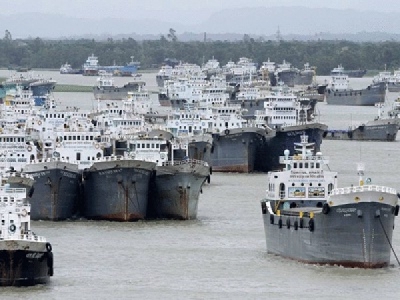
Posted on July 27, 2017
By Ibrahim Hossain Ovi, Anwar Hussain, Dhaka Tribune
Chittagong Port Authority has taken a series of measures to ease persisting vessel congestion which continues to cause huge losses in the country’s export and manufacturing sectors.
The decisions include allowing bigger container vessels at night and creating more space at the yard, procuring handling equipment, enhancing capacity of the off-docks, resuming capital dredging and keeping the port operational round the clock.
The decisions were taken at a meeting on Monday with all port users to facilitate export-import activities and keep the sea port operational 24 hours a day and seven days a week.
According to industry insiders, manufacturers have to pay more fare to feeder vessels as it has to overstay by 5-10 days to unload goods or choose costly air shipment to avoid delay.
Imported raw materials are also coming late and hampering production particularly in the garment industry, the chief source of foreign currency in Bangladesh.
The country’s apparel exports rose by only 0.20% in the last fiscal year, which is the lowest in one and a half decades.
“In clothing business, fashion, time and season are very important. If a manufacturer fails to deliver products in time, he wouldn’t be able to sustain in the business,” said Faruq Hassan, senior vice president of Bangladesh Garment Manufacturers and Exporters Association (BGMEA).
“Due to perennial congestion at the Chittagong seaport, which is the prime delivery point of export goods, the RMG manufacturers have to suffer a lot in order to import raw materials in time and ship the finished products within the deadline.
“These issues increase the production as importers have to pay more for delay in unloading products. To avoid delayed shipment, they have to choose air shipment which is costly.
“The great concern is that lighter ships or feeder vessels are unwilling to carry goods to Chittagong. This is because of huge congestion at the port,” he said.
Industry insiders said a feeder vessel or a lighter vessel has to wait 5-10 days to unload the goods due to congestion and shortage of enough jetties.
There are, however, no visible initiatives from the government to set up new jetties to expedite the unloading process, they added.
According to them, in the recent time, the congestion became a massive crisis for the export-oriented industries.
At the Monday’s meeting, CPA Chairman Rear Admiral M Khaled Iqbal said the productivity of the maritime port dropped a little bit due to seasonal imports before Ramadan, the national budget, less operational hours during Ramadan, bad monsoon weather, equipment shortage, cyclonic storms like Mora and the damage to the two gantry cranes.
“The process to procure 11 rubber tyre gantry cranes (RTG), four straddle carriers, five container movers and a rail mounted gantry crane (RMG) is underway.”
“Besides, a tender has been floated to procure six ships to Shore gantry cranes. To cope with the growth of container and cargo, we have taken up the initiative to construct Patenga Bay Terminal which will be completed by 2019,” the CPA chief added.
He said they had decided to expedite the scanning procedures at the port. “The scanning machines will be installed at the off-docks to ensure faster operations.”
“Capital dredging is going to be resumed by the end of the current year and operations at the four lighterage jetties will also begin,” the CPA chairman said.
Although the government is going to keep the port active round the clock, the sector people are in doubt about positive impacts of the decision.
“Keeping the port open for 24 hours would not be a solution until other authorities concerned including banks, customs and other service providers are aligned with the process,” Faruq Hassan said.
Exporters Association of Bangladesh President Abdus Salam Murshedy said they were working to meet the $50bn export target by 2021.
He urged the government to make all the ports fully operational to achieve the export target.
Murshedy put emphasis on establishing a new jetty soon, taking special measures in unloading export-oriented sectors’ raw materials and prioritising the unloading.
He called for procuring port equipment, quickening off-docking of auction goods, increasing number of scanners, instant delivery services and train up the manpower.
Source: Dhaka Tribune





